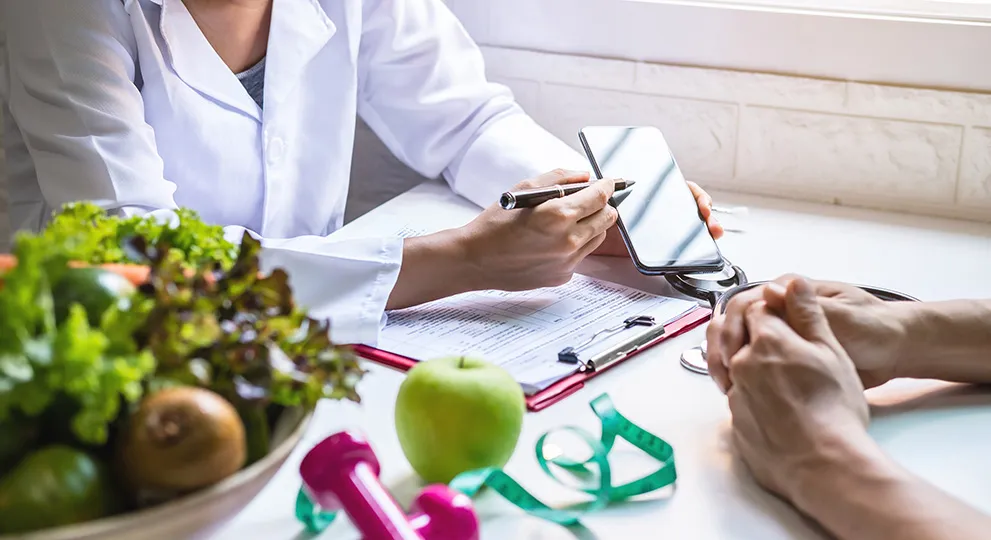Talking with an oncology dietitian
Talking with an oncology dietitian

As you go through treatment, your cancer care team may include various specialists who are trained in different fields. One of your team members may include a registered dietitian who specializes in oncology nutrition. The role of an oncology dietitian is to work with people living with cancer, their families and caregivers to help manage a patient’s diet. Some cancer treatments may cause side effects that make it hard to eat well, and it is the role of the dietitian to help minimize their impact through proper education and nutrition. They may suggest changes to your diet, including the types and amount of food, how often you eat and how the food is eaten.
Melissa Rifkin, a registered dietitian, discusses the importance of good nutrition for people who are living with cancer, including ways to work with members of your healthcare team to get the care you need.
How can cancer and cancer treatment affect your nutrition?
According to the National Cancer Institute, “Cancer treatments are designed to kill cancer cells. But these treatments can also damage healthy cells. Damage to healthy cells can cause side effects that lead to eating problems.” Depending on the type of cancer you have or the form of treatment you receive, it can be hard to eat well. Tumors in any area of the digestive tract can change the way the body uses certain nutrients. If you receive treatment that affects the head, neck, esophagus, stomach, intestines, pancreas or liver, it can also be hard for your body to absorb enough nutrients from the food you eat.
Also, consider how different forms of treatment can impact your nutritional status:
- Chemotherapy: common side effects include loss of appetite, vomiting and diarrhea
- Radiation Therapy: side effects may vary depending on the area of the body being targeted. For example, common side effects after radiation on the head and neck include trouble swallowing, dry mouth and sore mouth, throat and gums
- Surgery: increases the body’s need for protein and energy. Partial or full removal of any digestive tract organ may impact ability to process nutrients
When is it important to alert your oncology dietitian?
Malnutrition, or the lack of proper nutrition, is one of the ongoing concerns of someone going through cancer treatment. Most of the previously listed side effects of cancer treatment increase the likelihood of an individual becoming undernourished, which may lead to less energy, reduced immune function and decreased ability for healing. Severe malnutrition may also interfere with proper functioning of the heart, liver, kidneys and immune system. Malnutrition is just one thing to be aware of during treatment. If you notice any of the following, you should alert your oncology dietitian and treatment team as soon as possible:
- Significant reduction in energy
- Difficulty swallowing
- Changes to your appetite
- Quick and unexpected weight loss
- Persistent vomiting and/or diarrhea
How can your oncology dietitian help?
An oncology dietitian will work with other members of your healthcare team to check that you are healthy during and after treatment and troubleshoot nutrition-related issues that arise. They may offer counseling or suggest diet changes to help improve a patient’s nutrition, which may help decrease symptoms from cancer or treatment. Based on your side effects and health status, your oncology dietitian will help to ensure you are consuming enough calories and nutrients and may suggest supplemental nutritional options based on changes in appetite, weight and digestive challenges. An oncology dietitian may help to come up with creative ways to ensure you are consuming the right amount of nutrients to support your body despite the challenges that treatment may provide.
According to the American Cancer Society, “People who eat well are better able to cope with side effects of treatment. In fact, some cancer treatments may work better in people who are well-nourished and are getting enough calories and protein.” Your oncology dietitian can provide advice on a range of issues, as well as help you tailor your diet to your specific needs during treatment.
The information contained herein is provided for educational purposes only and is not intended to replace discussions with a healthcare provider. All decisions regarding patient care should be made with a healthcare provider.
Melissa Rifkin, MS, RD, CDN, is a registered dietitian from New York City where she has spent the last 10+ years working in oncology, surgery and bariatrics. She holds a bachelor’s degree in dietetics and a master’s degree in clinical nutrition. Melissa enjoys sharing her knowledge of nutrition and overall well-being through her Instagram account (@confessionofadietitian).













